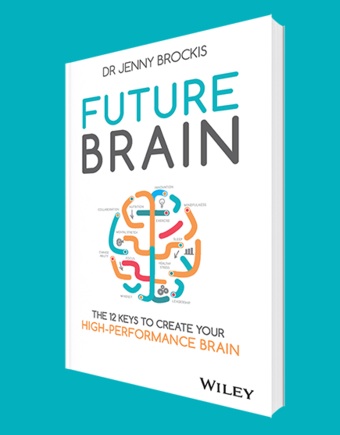What are the brain training keys that give your mind the power to keep going when it runs out of juice? Stephanie Wickens talks to Dr Jenny Brockis, author of Future Brain: The 12 Keys to Create Your High-Performance Brain about how to unlock the full potential of your brain
Whether it be a quick-fix solution to give your brain a little shove into machine mode for a few hours, or a long term brain training technique that strengthens your mind’s power over time.
Here are seven ways to boost your brain’s performance that you can start immediately.
#1 Feed your brain with colour
In her book Future Brain, Dr Brockis says that eating the right foods can increase our mental stamina, help us focus, aid memory, and even benefit our problem solving ability.
‘It’s all about the right fuel for the right vehicle,’ she explains.
dark chocolate boosts blood flow to key areas of the brain for two to three hours
In February 2016, a study led by Dr Ian Macdonald, Professor of Metabolic Physiology at the University of Nottingham, found that consumption of a cocoa drink rich in flavanols (a key ingredient of dark chocolate) boosts blood flow to key areas of the brain for two to three hours.
Dr Brockis has also linked dark chocolate with the brains ability to focus. She believes that colourful foods are the key to brain function, and highlights some of the the foods that have been shown in nutritional studies to assist focus are:
- Rich leafy greens – kale, spinach, and Chinese brocoli.
- Deeply pigmented red and blue berries – blueberries, cherries, plums, strawberries, and raspberries.
- Dark chocolate – minimum 70 per cent cocoa solids, preferably the best you can find, because here it’s quality, not quantity, that matters.
- Eggs – choline boosts focus and helps to reduce cortisol, one of our stress hormones.
Tip: If you feel too busy to stop and eat, remember that if you take the time to replenish your brain’s fuel stores it will increase efficiency and help you get your work done better and faster.

READ MORE: 8 ways to boost work productivity by taking breaks OFTEN
#2 Take a daily 30 minute walk or run
Dr Brockis says exercise enhances blood flow to the brain, leading to reduced brain shrinkage and increased neurogenesis (the growth and development of nervous tissue), and plasticity (brain flexibility), so your work performance is maintained.
In February 2016, researchers from the Department of Psychology and from the Department of Biology of Physical Activity at the University of Jyväskylä, found that aerobic exercise, such as running, has positive effects on the brain’s function when it comes to learning.
a 30 minute exercise session can improve mood and self-esteem, reduce stress, and also reduce the risk of anxiety and depression
According to Dr Brockis, a 30 minute exercise session can improve cognition, learning and memory. She says that it also improves mood and self-esteem, reduces stress, and reduces the risk of anxiety and depression.
Exercise can also decrease the risk of cognitive impairment, and lower risk of cognitive decline, and neurodegenerative disease (a term for a range of conditions which primarily affect the neurons in the human brain).
Dr Brockis explains that it’s important to choose something you think you will enjoy, for example, walking, swimming, cycling, or tennis, and do it on a regular basis. She advises that you start slow, and gradually increase the number of sessions each week, and their duration.
Once you get started, you will begin to experience the natural endorphin rush that makes you feel good, and motivates you to want to do it again.
Tip: Sitting for long periods of time reduces the blood flow to the brain. Whenever you feel mentally tired, try taking a brain break by getting up to stretch and move for 10 to 15 minutes.

#3 Take a 20 minute nap before 3pm
Sleep provides us with greater physical and mental wellbeing. It allows for neuronal repair and maintenance, and it also brings mood regulation. Dr Brockis says that naps can be highly beneficial to brain function, especially if those brains have been working hard over an extended period of time.
In 2010, research conducted by the University of California Berkeley found that an hours nap can dramatically boost and restore your brain power.
Their findings suggest that a biphasic sleep schedule (the practice of sleeping multiple times within a 24 hour period), not only refreshes the mind, but can also make you smarter.
the practice of sleeping multiple times within a 24 hour period not only refreshes the mind, but can also make you smarter
Dr Brice Faraut, of the University Paris Descartes, reports in a study published in the Journal of Clinical Endocrinology & Metabolism, that a 20-minute nap can increase cognitive performance by up to 40 per cent, with the benefit lasting two to three hours.
Dr Brockis advises that keeping the nap to 20 minutes avoids sleep inertia, which is that groggy feeling we experience if woken up from a deeper level of sleep. Keep power naps to the afternoon between lunchtime, and no later than 3pm to avoid disrupting night sleep patterns.
Tip: Whenever possible keep to a regular 40-minute pre-bed routine to prepare your brain for sleep.
MORE: 9 aphrodisiac foods to get you in the mood
#4 Channel your inner King Arthur (get curious)
Channel your inner King Arthur and see if you can pull the sword from the stone. Explore your curious side by signing up to learn a musical instrument, learning to dance, or taking painting classes.
Make curiosity a daily habit by doing cryptic crossword puzzles, learning three new words and their meanings everyday, or reading a book in a different genre from your common preference.
our pursuit of new information rewards our brain with the release of dopamine that drives us to continue in our quest to investigate
Researched published in 2014 in the Cell Press Journal, suggests the more curious we are about a topic, the easier it is to learn information about it. Lead author Dr. Matthias Gruber, of the University of California at Davis, says that the findings ‘reveal insights into how a form of intrinsic motivation – curiosity – affects memory.’
curiosity didn’t kill the cat, it made her smarter.
Dr Brockis explains our pursuit of new information rewards our brain with the release of dopamine that drives us to continue in our quest to investigate. It can result in providing us with the means to be more focused, more insightful, and more adaptive.
So in other words, curiosity didn’t kill the cat, it made her smarter.
Tip: Set out to learn about things you’re interested in, and the key learnings from them will flow – and feel easy and effortless.

#5 Play video games (seriously)
Playing a fast paced action-packed video game for an hour or so several nights a week is great for building attention. Dr Daphne Bavelier, a neuroscientist professor of brain and cognitive sciences at the University of Rochester, says that video games make our brain smarter, better, faster and stronger.
video games that involve high levels of action, such as first-person-shooter games, increase a player’s real-world vision
In 2009, research showed how video games that involve high levels of action, such as first-person-shooter games, increase a player’s real-world vision.
According to Dr. Bavelier, a gamers ‘ability to perceive changes in shades of grey improves up to 58 per cent.’
The average gamer is in their 30s, so these games are clearly not just for the kids. While it is recognised that overplaying certain video games can lead to problems with addictive behaviour, for the vast majority, playing games can stimulate the brain.
Dr Brockis says gamers develop sharper visual acuity, which can help them pick out a stranger in a crowd and observe small details. They are also better at tracking more objects simultaneously.
Games boost our attentional networks (alerting, orienting and executive), driving plasticity. Gamers are also better at task switching with less cognitive cost compared with non-gamers.
a gamers ability to perceive changes in shades of grey improves up to 58 per cent
Training on action games can help people improve their performance in different mental tasks, and this improvement persists for months after the training has finished.

#6 Meditate at work
Since Chade-Meng Tan, Chief Happiness Officer at Google, introduced his Search Inside Yourself program in 2007, many other companies have introduced mindfulness programs, including Aetna, The Huffington Post, and Apple.
Companies are funding these programs for their staff and setting up meditation rooms. They have found that offering meditation classes to employees as part of a workplace wellness program can increase productivity, reduce stress-related illness, reduce the incidence of mistakes and errors, and improve recall and memory.
meditation classes as part of a workplace wellness program can increase productivity and reduce stress-related illness
In 2012, research conducted by the University of California, Los Angeles, found that long-term meditators have larger amounts of gyrification (‘folding’ of the cortex, which may allow the brain to process information faster) than people who do not meditate, and they also found that meditation strengthens the connections between brain cells.
Dr Brockis believes that if you practice daily meditation anywhere between five to 50 minutes a day, like how you would practice a musical instrument everyday, it could result in two to three hours of efficient, high-quality work.

READ MORE: How meditation changes your brain
#7 Find your tribe (and stick with them)
Humans are social creatures that excel when it comes to making connections with each other. Our brain relies on our ability to build relationships.
Typically, the people we like best are those we see as similar to ourselves, and therefore we’re more likely to connect with them.
Dr Brockis says that maintaining exceptional social skills is important because relationships are a key tool for better brain performance.
She explains that ‘at work, when we don’t feel part of a tribe, our lack of relatedness manifests in poorer performance, lower engagement and higher staff turnover.’ If you don’t feel accepted by your co-workers, then you’re more likely to leave the job.
at work, when we don’t feel part of a tribe, our lack of relatedness manifests in poorer performance, and lower engagement
Social exclusion, whether intentional or through apathy, causes social pain, which lowers self-esteem, confidence and mood.
So working to develop a better relationship with your colleagues will make you feel like part of the tribe, and therefore improve your brain’s performance.

Brain Awareness Week (BWA), the global campaign to increase public awareness of the progress and benefits of brain research, takes place between the 14th March to 20th March.
Future Brain: The 12 Keys to Create Your High-Performance Brain by Dr Jenny Brockis is available on Amazon.
Dr. Jenny Brockis Medical Practitioner, healthy brain advocate and future mind planner has long been fascinated by the brain and human behaviour.
Her mission is to become the Jamie Oliver of brain fitness, making brain health as widely appreciated as nutrition.
She believes that elevating brain and organisational health is the way forward to build personal and professional capability, achievement and happiness.
Follow her on twitter: @drjennybrockis
Relevant Healthista Content:
Fitness sensation Krissy Cela reveals 10 tips on getting back into the gym post lockdown
10 ways to boost sexual confidence post-lockdown
11 simple ways to de-stress during self isolation
Self-isolation – 7 steps to make your home a feel good space
Healthista Content you may also like:
Need an energy boost? Start your day with one of these 5 easy recipes
Feeling tired all the time? This one minute energy boost will do the trick
Tired all the time? These 11 energy foods will help
3 energy tips this TV doctor wants you to know
Like this article? Sign up to our newsletter to get more articles like this delivered straight to your inbox.

























































